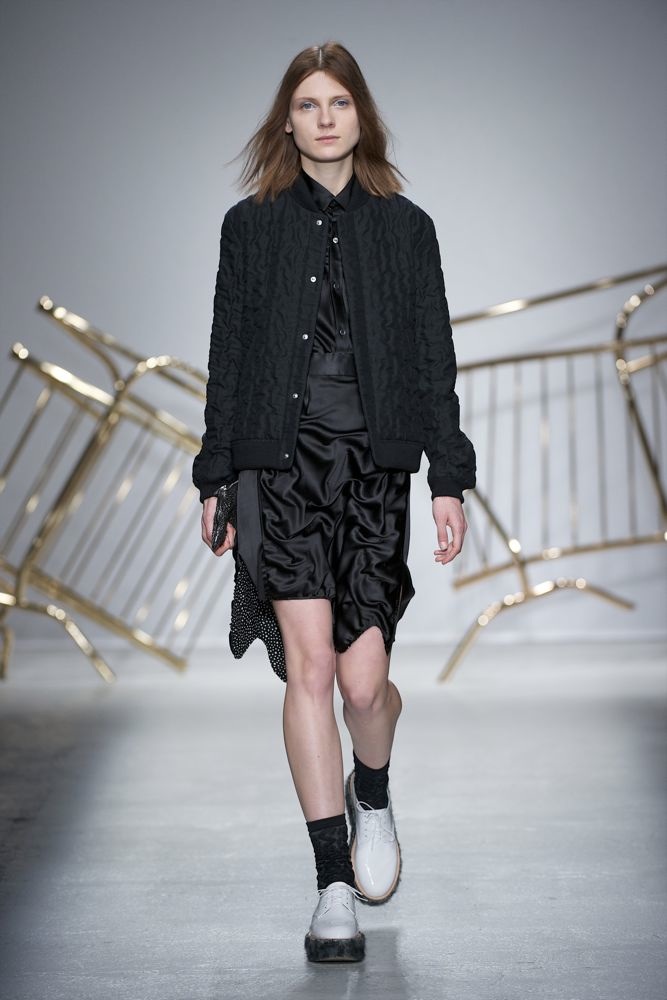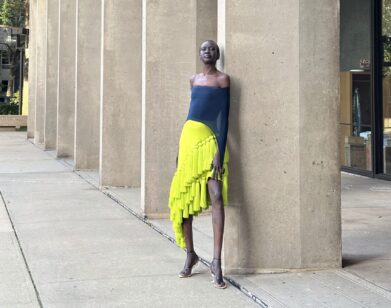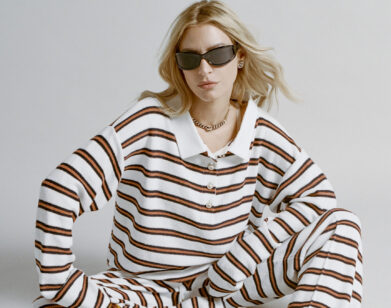In the Realm of Julien David
Ask Julien David about the fashion houses he most admires, and he won’t cite the long-established, much lauded French houses such as Lanvin, Givenchy, and Céline. “I pay more attention to streetwear than high-fashion brands,” he explains. “I look more at brands like North Face or a brand like Nike, how they push the envelope with their footwear.”
David is one of those multi-faceted fashion designers who never intended to work in fashion at all. Born just outside of Paris, David moved to New York at the age of 19 to study graphic design and freelance. “I got a bit bored and started following classes at Parsons in product design, interior design, and fashion design,” he tells us over the phone from Tokyo, his current home base. “My [fashion] teacher was quite encouraging, so I signed up for a two-year program.”
Following Parsons, David interned at Ralph Lauren and Narciso Rodriguez. He hasn’t regretted his career choice—at least not yet. And why would he? In 2012, four years after starting his eponymous label, David was awarded the prestigious ANDAM prize and expanded into menswear. He has a flagship shop in Tokyo, and his stockists include high-fashion approved boutiques such as Colette, Opening Ceremony, Dover Street Market, The Webster, Le Bon Marché, and Net-a-Porter.
Among the projects David is currently working on are a three-year collaboration with a surf brand; his Men’s S/S 2015 collection, which he will show at the end of the month in Paris; his women’s pre-collection; and, of course, his S/S 2015 womenswear collection, which he was just beginning when we spoke. David does not view the four projects as entirely separate entities; “I try to have some bridge that goes from one collection to another, because they often end up going in stores simultaneously,” he says. “For the menswear collection, because I’m in collaboration with the surf brand, it’s going to be related to that. For the ladies’ pre-collection,” he adds, “I’m taking references from preconceived ideas about parties.”
EMMA BROWN: Do you think of your collections as story-based?
JULIEN DAVID: It is based on a theme every season, but it’s not necessarily the same kind of theme. I try every time to find a new approach to a theme. When I have something that interests me, I keep it somewhere—on my computer, on an email. I will write it down and I will let days and weeks pass by. If what I wrote is still relevant and still interesting after a while, then I consider maybe it can become a good concept for a collection.
BROWN: Do you ever have trouble thinking of a theme?
DAVID: No. [laughs] It’s more the other way around. I have too many things I want to do, and it’s kind of hard to narrow it to the one that stands out. So far it’s been like that. But sometimes what happens is that, like for example when I work on the pre-collection, I touch on something that I feel could be a collection on its own. I don’t push it just for the pre-collection; I wait and reserve it for the [main] collection. It happens just by working, something that you work on becomes more interesting. You feel like you can create more with it.
BROWN: How do you feel that your aesthetic has changed since you first started? Do you feel like it has changed?
DAVID: The base of my work is the same. What made me start is that I thought it’s funny the way fashion’s presented; the way high-end products are presented is often done in the same way. I saw many people going in the same direction, and then they do their take on it. I thought, “What if I tried to present it differently? What if I tried to find another approach to what a luxury item is?” I thought if I can take the interest and the knowledge I have in streetwear and mix it with the things I’ve learned from working and having studied fashion, I can create a new type of product, a new approach to a luxury product. That was the beginning. I’ve learned a lot since my first collection. When you start, you don’t have any customers, so you approach it differently. When you start having customers and having a response to what you create, I think that really changes what you do. It’s something that you have to feed in a way, and it’s important because it allows you to continue to move forward. It’s an indirect impact on your creativity.
BROWN: Do you feel like winning ANDAM really changed things for you?
DAVID: Yes. I won it at an important moment because when I won the ANDAM, I didn’t have any men’s clothes. I didn’t have a store. I didn’t have any accessories. When I won, because of the money I won and the advice I got, I was able to start those three things, and it changed my business drastically. It really made me grow quicker. It was fuel to develop my business, and also lots of exposure, which was nice.
BROWN: What’s the best advice you got through winning ANDAM?
DAVID: When I won, the mentor for the year was Pierre-Yves Roussel. He’s the head of fashion for LVMH. He followed my business for one year and he was able to introduce me to a great leather factory that I still work with today in France for my handbags. He gave me some advice about how to be direct about what I try to communicate. When you are in your own collection, in your own realm, you make references that are very clear for yourself but not necessarily for people who have just discovered your brand. As you grow many people come on board; they don’t necessarily know the first collection you’ve done. You always have to try to be inclusive in any collection so people who have been following me for one year are able to get the same from my brand as people who have known me for three years. I needed that kind of advice and I think I really started to focus more.
BROWN: If not a fashion designer, what did you want to be when you were a child?
DAVID: When I was really, really young, I liked drawing and I liked colors. I liked anything visual and creative. When I became a teenager I got into music, and for a few years, I thought it would be nice to be a musician. It lasted until I was 15 or 17. Then, somehow, it disappeared and I started working.
BROWN: Are you still interested in music?
DAVID: Yeah, I’m still really into music. There’s a link to culture and to music and to art; there’s a nice dynamic, I think, between what happens in music and what happens in fashion. It’s something I’m thinking about.
FOR MORE ON JULIEN DAVID, VISIT HIS WEBSITE.







